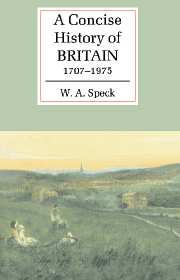Book contents
- Frontmatter
- Dedication
- Contents
- List of illustrations
- Preface
- Introduction
- 1 Eighteenth-century Britain
- 2 From the Anglo-Scottish Union to the Union with Ireland
- 3 Nineteenth-century Britain
- 4 From Pitt to Palmerston
- 5 From the second Reform Act to the Boer War
- 6 Twentieth-century Britain
- 7 From the Boer War to the first Labour government
- 8 From Baldwin to Attlee
- 9 From the accession of Queen Elizabeth to the entry into the European Economic Community
- Epilogue
- Appendix: Monarchs and ministries, 1707–1976
- Guide to further reading
- Index
Introduction
Published online by Cambridge University Press: 05 June 2014
- Frontmatter
- Dedication
- Contents
- List of illustrations
- Preface
- Introduction
- 1 Eighteenth-century Britain
- 2 From the Anglo-Scottish Union to the Union with Ireland
- 3 Nineteenth-century Britain
- 4 From Pitt to Palmerston
- 5 From the second Reform Act to the Boer War
- 6 Twentieth-century Britain
- 7 From the Boer War to the first Labour government
- 8 From Baldwin to Attlee
- 9 From the accession of Queen Elizabeth to the entry into the European Economic Community
- Epilogue
- Appendix: Monarchs and ministries, 1707–1976
- Guide to further reading
- Index
Summary
This concise history covers the period from the formation of the United Kingdom of Great Britain in 1707 to the entry of the British into the European Economic Community in the 1970s. Thus the chronology spans the whole history of Britain in the precise sense that the Union of 1707 brought it into being, ending the separate sovereignty of England and Scotland, and was for the Scots at least the ‘end of an auld song’; while membership of the EEC was a partial surrender of British sovereignty, even if few were prepared to recognise it or admit it.
To cover such a long period in such a short compass is inevitably to reduce a symphony to a sleeve note. Some concentration is required to pick out the main themes. The principal theme is that change has been evolutionary rather than revolutionary. The peaceful adjustment of institutions and social structure to changing circumstances has been largely due to the fact that, since the Glorious Revolution of 1688, machinery has always existed for effecting such changes without resort to rebellion or revolution. There have not been wanting rebels or revolutionaries – Jacobites in the eighteenth century, Jacobins in the early nineteenth, for example – but they have never appealed to more than a minority. The majority have either acquiesced in the status quo or accepted that desired changes could be obtained by persuasion rather than by force.
- Type
- Chapter
- Information
- A Concise History of Britain, 1707–1975 , pp. 1 - 3Publisher: Cambridge University PressPrint publication year: 1993

